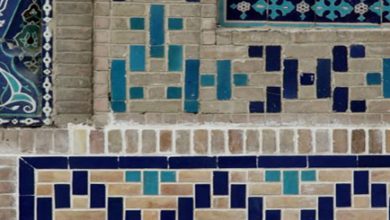HUD AS

Prophets and Messengers are not accountable for the results of their dawah efforts. Their duty is only that of clear and unambiguous notification, disseminated to their respective communities with patience and kindness – such that the people would not be able to plead ignorance as a defence when questioned by their Lord on the Day of Judgment. As the stories of the Prophets and Messengers continue, we shall see that similar methods of persuasion were used by the Prophets and Messengers, and the refusal of their respective communities likewise adopted a similar pattern as that of the disbelieving communities of Nuh AS and Hud AS.
Hence, the people of ‘Ad resisted Hud’s AS call to monotheism, instead following the customary religion of their forefathers.
The Destruction of ‘Ad
It is unclear how long Hud AS spent trying to convince his people, but what is clear is that his efforts bore little fruit, gathering only a handful of believers by the end of his mission.
Ultimately though, it became obvious that the rest of his people were unrelenting in their falsehood and tyranny. As demonstrated in the story of Nuh AS, the supplication of a Prophet against his people is supremely powerful. When the opposition and hostility against him and the message he carried reached its peak, Hud AS begged to Allah: ” ‘My Lord! Help me, for they accuse me of falsehood.’ Allah said ‘Very soon they will become remorseful.'”(23:39- 23:40)
In the case of Nuh’s AS community, water was used as a means of their destruction. Here, Allah gathered another element, the wind. At first, the people of ‘Ad suffered drought and famine, yet still clung on to their idolatry, refusing to turn to Allah.
They wished for rain to alleviate their hardship and irrigate their parched land. One day, they finally saw a dense cloud approaching them. They rejoiced, confident that the cloud carried the much needed rain they were longing for. However, their hearts constricted in terror when they discovered that the cloud did not carry any rain, but rather, a painful torment in the form of wind. This was the punishment that they had rashly challenged Hud AS to produce, and now they were confronted with the horrifying fruition of their request.
Allah said “Then, when they saw a dense cloud coming towards their valleys, they said: ‘This is a cloud that shall give us rain.’ No this is that you were asking to be hastened! A wind wherein is a painful torment.’ (46:24)
This was no ordinary wind, like the curses in this life and the hereafter which were established against them, the furious wind descended upon the disbelievers, pursuing them relentlessly. “Which He made it rage against the for seven nights and eight days, uninterruptedly…” (69:7). This fatal wind followed them everywhere as they tried to scatter to safety, even into their dwellings, destroying every last palace, landmark and monument that dotted the terrain, and leaving a trail of total destruction in its wake.
Such was the reply to their earlier boast, when they asked who was mightier than they were – and Allah displayed to them that a simple and unassuming force of nature was capable of obliterating their entire existence. There was no respite. The deadly wind would target each of the surviving disbelievers with accuracy, swooping them into the air and hurtling them head first onto the ground to their disgraceful deaths. Upon impact, their heads were smashed and their headless bodies resembled stumps of palm trees. “We sent upon them a raging wind on an ill-fated day of constant calamity. Plucking up the people as if they were uprooted trunks of palm-trees.” (54:19-54:20)
Eventually, there was nothing left. These colossal people suffered terrible deaths, although this was just a prelude to their eternal torment in the Hereafter. Their statures and status afforded no protection against the curse and wrath of Allah, and they were reduced to nothingness. Only Hud AS and his small group of followers were rescued from this terrible fate.
Today, no trace of this once great civilization exists, and where once the mighty pillars stood, nothing can be seen except for sterile and barren land.
Lesson for us – Resistance from Others and How Can the Vulnerable be so Arrogant?
Whether you are a new Muslim, or one who tries to relive Islam in your life, or one who tries to establish Islam in your community, the pattern will always be the same. You will be met with resistance – more likely than not, from your closest family in the first instance, and then from society. It is normal that one who truly embraces Islam, or even outwardly display their Islamic belief (such as the wearing of the hijab) will be labelled as backward, a fanatic or extremist by the same people who would lend support for leading a reckless, materialistic or heedless lifestyle.
One should not lose heart. History has shown that no faith is built without opposition. Even the Prophets and Messengers suffered this fate. Those coming to Allah will initially be opposed, ridiculed and laughed at. It is the trial set by Allah, and those who pass will be granted victory, in this life and the Hereafter.
Even with the passing of generations between Nuh AS and Hud AS, the arguments presented by the non-believers remain the same. This is because the instigator, Shaitan, is the same, and has limited ideas. Hence the replies of non believers always follows the same narrow sequence. The conclusion is however, when a community strays completely, it will be punished.
The tribe of Ad were tall, strong and powerful – their power remains unsurpassed to this day. One of the diseases that Shaitan left with the people of Ad is the false notion that they will live forever. In return, one of the calamities Allah gave to them was to open all the goodness – He gave them water, rain and beautiful land. Instead of thanking the Creator and discovering who the Provider was, they forgot the Message and became arrogant.
The story of Hud AS also shows Allah’s ability to convert a simple force of nature into a fatal and disgraceful punishment to non believers. Even today, with our sophisticated weather stations, we are unable to accurately predict the next hurricane, or even defend ourselves adequately when the elements of nature are unleashed upon us. We watch this repeatedly in the news, of people being stranded after a cyclone or a typhoon, of trucks being lifted into the eye of the hurricane as effortlessly as a feather. Do we still remain arrogant to the might of Allah after seeing display after display of nature’s fury? We should avoid the path of the people of ‘Ad, who seemed to think that their monuments would outlive everything else in the world, for all man made creations are fragile and vulnerable beyond belief compared to the might of Allah.
We forget that the Owner of the earth who provides us with the beautiful weather and kind breeze, can change it into His wrath, destruction and death. Did you ever ask yourself why He does this and what the wisdom behind it is? Instead of blaming Mother Nature, did you ever say “Oh God, give me the wisdom”?
Why does Allah give us ease, why does He give us difficulty? Did we ever think about death and destruction – is that all there is to it? We never think beyond this, for example, what will happen to the people who perished, and where are they going?
One of the diseases of mankind today is that we are reluctant to think beyond death, which is the opposite of the Message. We are inheritors of this earth and we are here for a short time. We have seen repeatedly what Allah has done with others. This is actually a warning, but not a warning to the dead, but a warning to those who are still alive. We leave you with the following passage from Ya-Sin:
That he or it (Muhammad SAW or the Quran) may give warning to him who is living (a healthy minded the believer), and that Word (charge) may be justified against the disbelievers (dead, as they reject the warnings). (36:70)


![Photo of ADAM AS [ PART 1]](/wp-content/uploads/2020/09/d6086de322f98f66cc694f32ea284557_XL_0-390x220.jpg)
![Photo of ADAM AS [ PART 2 ]](/wp-content/uploads/2020/09/106117794.Gu9ZCkGy-390x220.jpg)
![Photo of NUH AS [ PART 1]](/wp-content/uploads/2020/09/130243396.pTC5gkej-390x220.jpg)